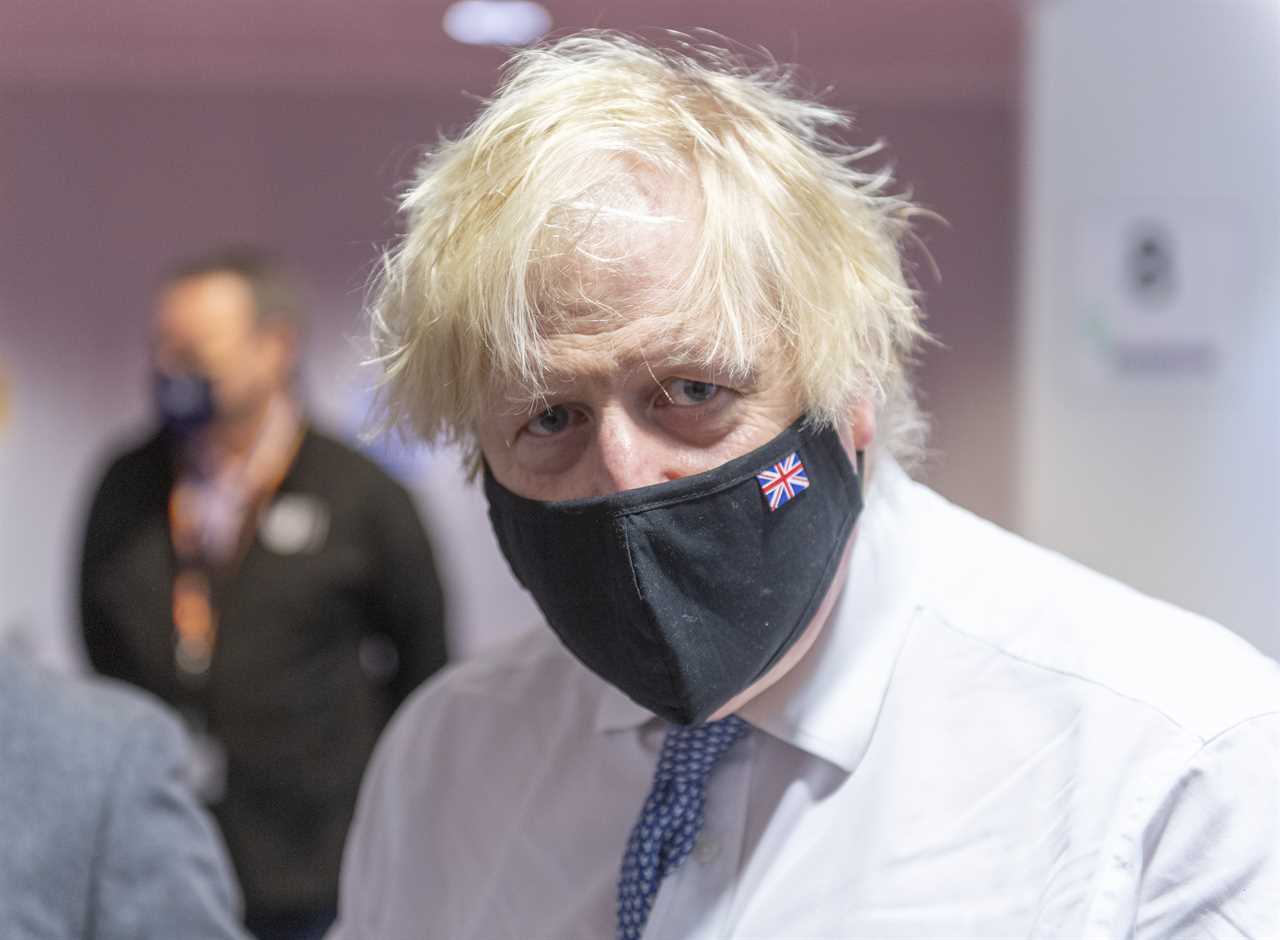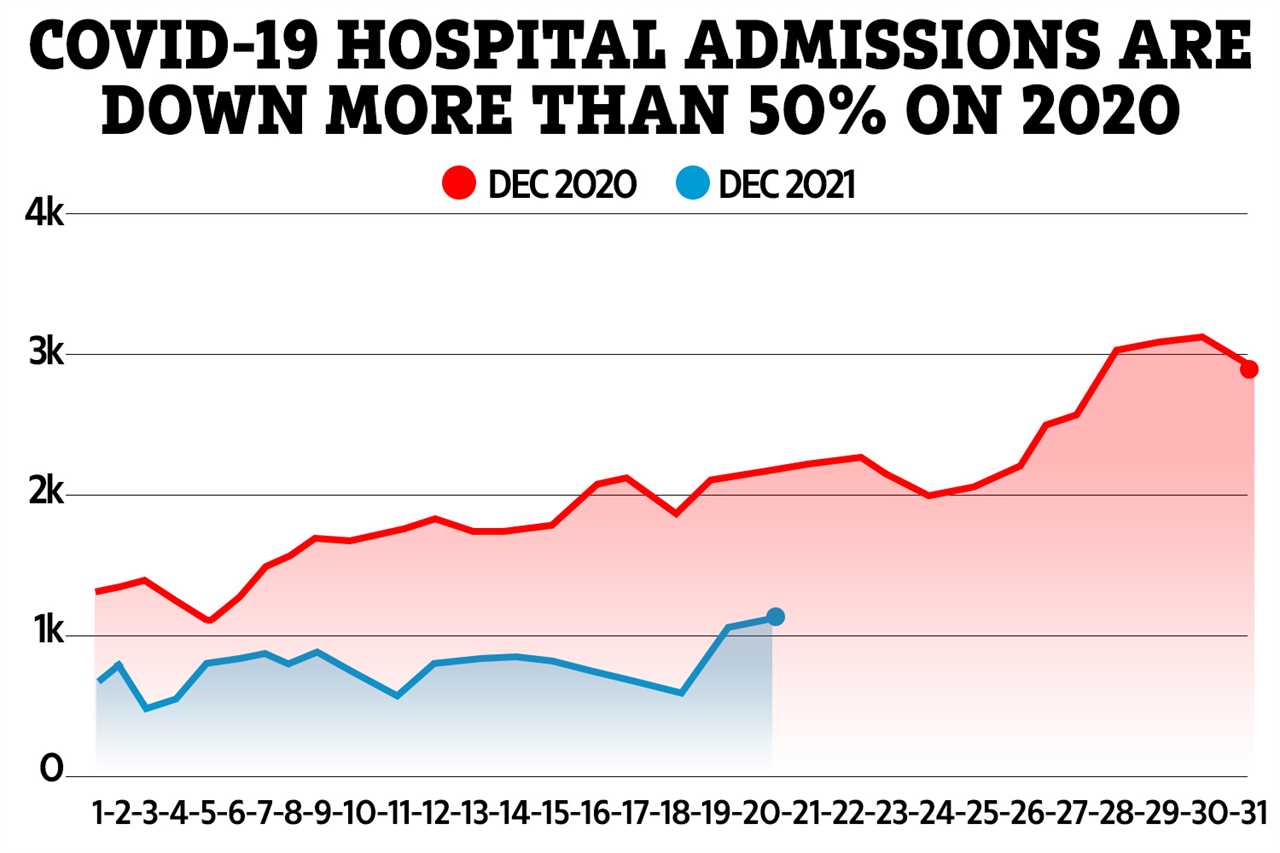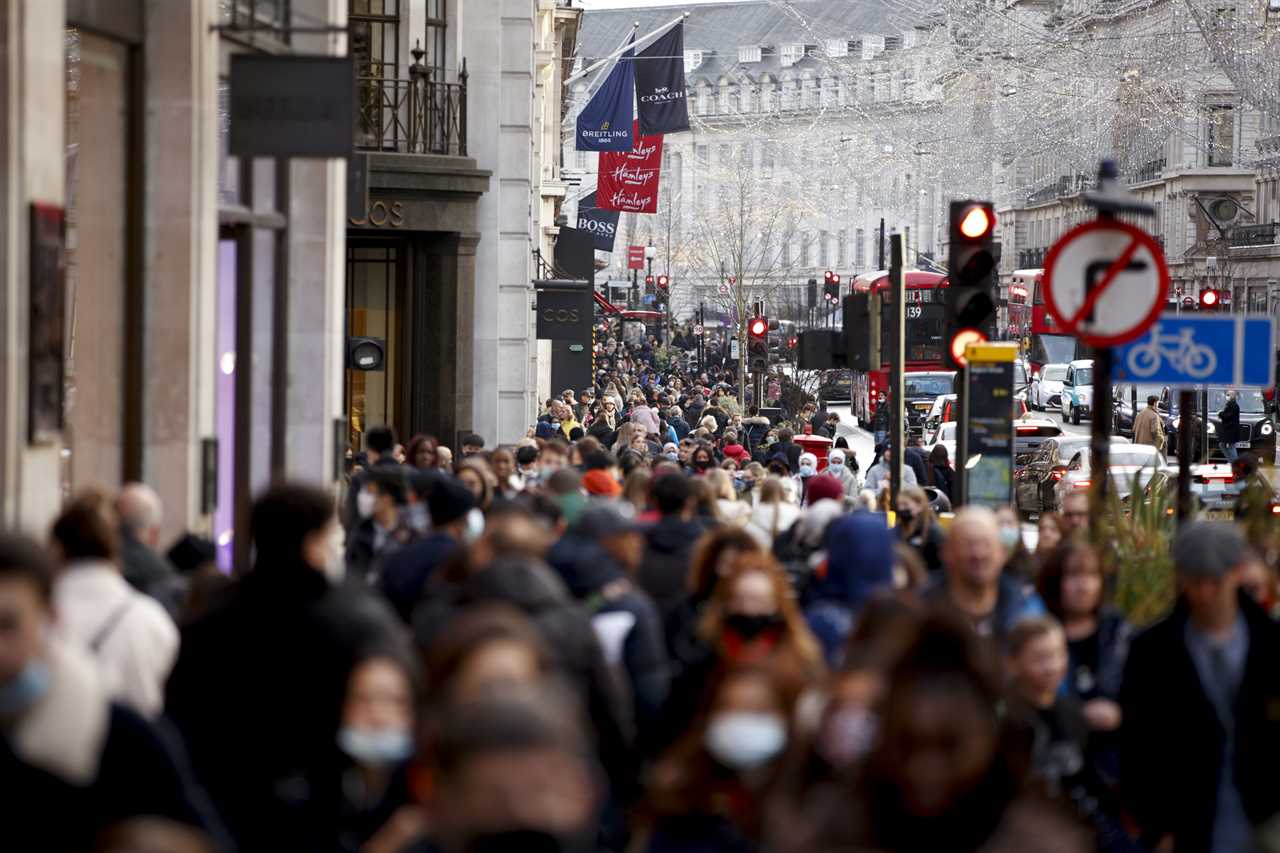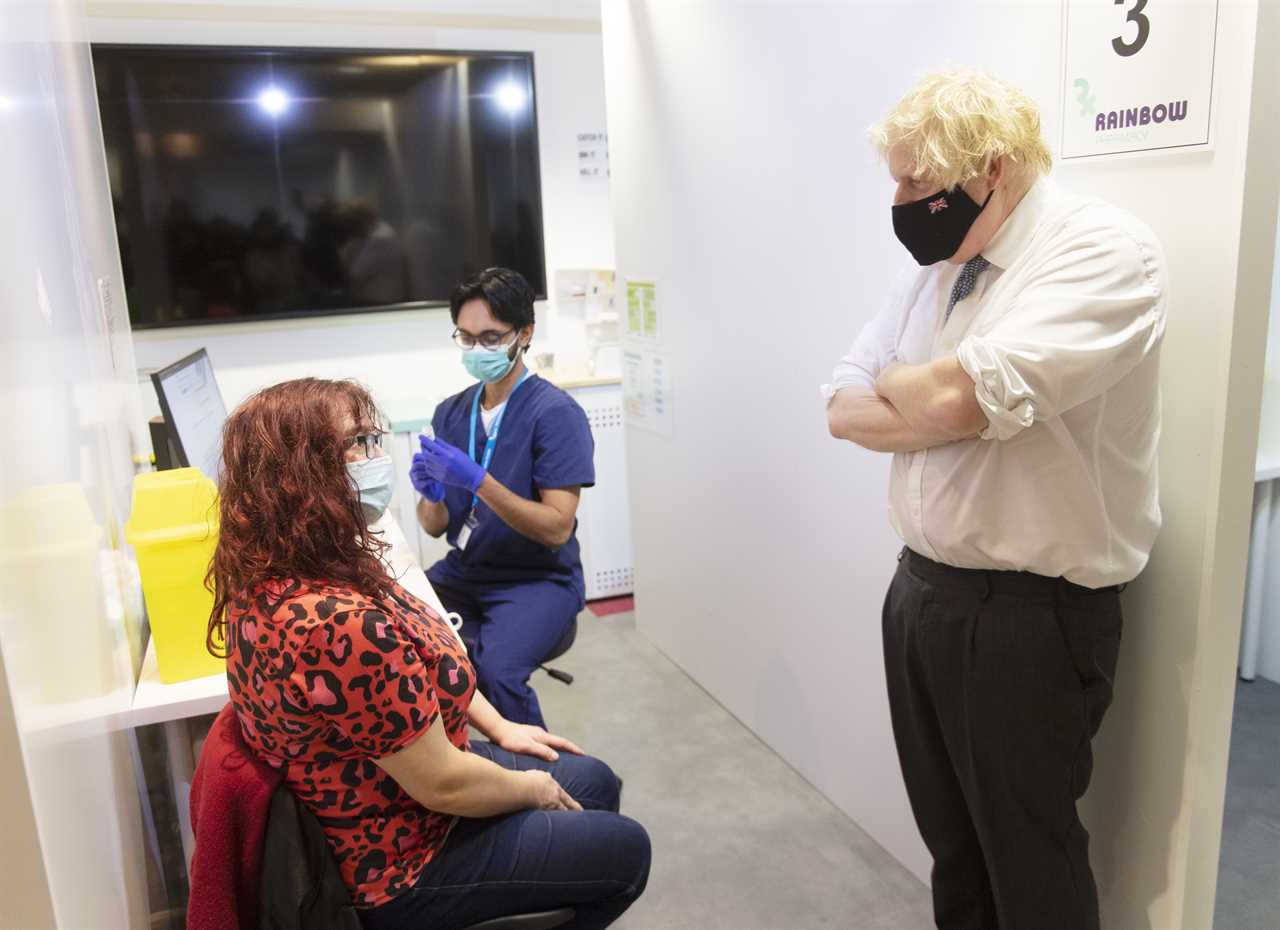BRITAIN’S monumental jab rollout has saved New Year’s Eve – but Brits must get boosted NOW to ward off January restrictions, Boris Johnson said.
The PM – speaking for the first time since the Christmas break – insisted that the UK’s soaring vaccine totals are the reason why England can have a rule-free December.

But he begged the unvaccinated few to get their first, second or booster jabs NOW to ward off lockdown post-January 1 – as Omicron cases continue to soar.
His calls follow a string of hugely positive studies which showed Omicron IS milder than other strains, with the first official UK report revealing the risk of hospitalisation is 50 to 70 per cent lower than with Delta.
Covid booster jabs protect against Omicron and offer the best chance to get through the pandemic, health officials have repeatedly said.
Trending In The News’s Jabs Army campaign is helping get the vital extra vaccines in Brits’ arms to ward off the need for any new restrictions.
Speaking on a visit to a vaccine centre this morning, the PM insisted: “We’re able to proceed in the way that we are.
“But there is one reason, and one reason only why we’re able to do that.
“And that’s because such a huge proportion of the British public have come forward to get vaccinated and particularly to get boosted.
“We’ve done about 32 and a half, maybe more million booster jabs.”
“And that is allowing us to celebrate the New Year in the cautious way that we are.”
Asked how England has escaped the same post-Christmas Covid crackdown hitting Scotland, Wales and Northern Ireland, the PM said the incredible jab rollout is to thank.
But he stressed that more jabs in arms are needed to “really finish off that work” going into 2022.
He also warned that the majority of people getting seriously ill with Covid are people who haven’t been vaccinated, or haven’t had their booster jabs.
Follow our Omicron Covid live blog for all the latest news & stories
He vowed that everyone in the country will have been offered a booster as promised by the end of the year.
The PM’s call to get Brits jabbed comes as Government insiders claim local lockdowns will NOT be making a comeback – but a decision on national restrictions could still be just DAYS away.
Mr Johnson saved New Year’s Eve for millions of Brits on Monday, when he announced that NO new lockdown rules would be in place before January 1.
But as gloomy top docs warn of increasing hospitalisation rates in Omicron-hub London, Downing Street sources are refusing to rule out UK-wide restrictions.
Measures under consideration include the loathed Rule-of-Six for indoor mixing, The Daily Telegraph reports.
Other reinforced measures could include outdoor dining only for pubs, restaurants and cafés.
A Government insider told The Times: “There are big downsides to doing anything regionally and we saw the difficulties they posed when we did it last time.
“It is difficult for people to understand because of different sets of rules.
“We want one set of rules for everyone in the country, which is easier to understand.”
Another added: “We are not looking at doing regional restrictions. That is not on the table.”
In other Covid-19 news:
- Thousands of Scots prepare to cross the border on New Year’s Eve to escape Nicola Sturgeon’s Covid clampdown;
- UK daily Covid cases hit record high with 129,471 positive tests – but deaths fall to 18;
- Third of cancer patients are waiting more than two months to receive treatment;
- Travel bosses are demanding an end to expensive Covid tests for Brits returning from holidays as Omicron “has already spread”.
While there will not be any new measures announced this week, the PM is assessing the data “day by day”.
This means a decision on post-January 1 rules could come as early as Monday.
Figures released by the NHS yesterday show that a total of 9,546 people were in hospital in England with Covid-19 as of 8am on December 28.
This is up 38 per cent from a week earlier – and is the highest number since March 3.
But analysis has shown that admissions are down more than 50 per cent compared to this time last year.
And ministers have stressed that many patients are going to hospital for unrelated issues before being diagnosed with Covid on admission.
Health minister Gillian Keegan yesterday said: “Many of those people going into hospital actually going in with Covid. So they actually get tested on the way in, but we do watch very carefully all of the data.
“And we have had some some good news that it does seem to be a bit milder in terms of severity.
“But we do watch the hospitalizations and we do watch the number of people in hospital all the time.”
A total of 8,474 people were in hospital with coronavirus on Monday – a huge drop on the massive 19,277 admissions recorded on the same day in 2020.
Health bosses have confirmed that Monday’s hospitalisation figure – although higher than Sunday’s – is no cause for concern.
There are 842 hospital-bound patients on ventilators – the lowest in two months – with winter-induced increase as seen last year.
And data has also shown that a third of patients who have Covid in hospital are actually being treated for something else.
The number going to hospital with the virus fell before Christmas — with 1,020 admitted on Christmas Eve compared to 1,252 the day before.
NEW YEAR SAVED
Fatality figures have also decreased, with 742 deaths reported in the last seven days – down 5.6 per cent on the week prior.
While it appears there has been a week-on-week rise in hospitalisations, NHS Providers chief executive Chris Hopson stressed that the data is tricky to interpret.
He told BBC Breakfast there had been a 27 per cent increase in the number of hospital admissions nationally over the past week, and a 45 per cent increase in London.
He said: “In the previous peaks, we’ve had some very seriously ill older people who’ve got really significant respiratory problems and… they had to go into critical care.
“The difference this time is we’ve got quite a few patients who are coming in – they might have fallen off their bike and knocked their head or broken their leg – and what’s happening is they’ve got no symptoms but when they arrive, they’re actually testing positive for Covid.
“Interestingly, the statistics that we use don’t actually distinguish between those two.
“So we just need to be careful about overinterpreting the data.
“The key bit… is that we still don’t know exactly what’s going to happen at the point when Omicron meets the older population.
“Clearly we’ve had a lot of inter-generational mixing over Christmas, so are we going to see a significant number of increases in terms of the number of patients coming into hospital with serious Omicron-related disease.”
And yesterday, a top doctor said that mass deaths and hospitalisations were over due to the success of the jabs rollout.
Professor Sir John Bell backed Boris Johnson’s decision to save New Year’s Eve and introduce NO new lockdown rules yesterday.
The regius professor of medicine at Oxford University said last year’s “horrific scenes” at hospitals where thousands suffered painful deaths from Covid-19 will remain a thing of the of the past.
Sir John said Britain’s vaccine drive is responsible for keeping hospitalisation and death rates low – as the latest analysis shows admissions are DOWN more than 50 per cent in a week.


Other reinforced measures could include outdoor dining only for pubs, restaurants and cafés.
A Government insider told The Times: “There are big downsides to doing anything regionally and we saw the difficulties they posed when we did it last time.
“It is difficult for people to understand because of different sets of rules.
“We want one set of rules for everyone in the country, which is easier to understand.”
Another added: “We are not looking at doing regional restrictions. That is not on the table.”
In other Covid-19 news:
- Thousands of Scots prepare to cross the border on New Year’s Eve to escape Nicola Sturgeon’s Covid clampdown;
- UK daily Covid cases hit record high with 129,471 positive tests – but deaths fall to 18;
- Third of cancer patients are waiting more than two months to receive treatment;
- Travel bosses are demanding an end to expensive Covid tests for Brits returning from holidays as Omicron “has already spread”.
While there will not be any new measures announced this week, the PM is assessing the data “day by day”.
This means a decision on post-January 1 rules could come as early as Monday.
Figures released by the NHS yesterday show that a total of 9,546 people were in hospital in England with Covid-19 as of 8am on December 28.
This is up 38 per cent from a week earlier – and is the highest number since March 3.
But analysis has shown that admissions are down more than 50 per cent compared to this time last year.
And ministers have stressed that many patients are going to hospital for unrelated issues before being diagnosed with Covid on admission.
Health minister Gillian Keegan yesterday said: “Many of those people going into hospital actually going in with Covid. So they actually get tested on the way in, but we do watch very carefully all of the data.
“And we have had some some good news that it does seem to be a bit milder in terms of severity.
“But we do watch the hospitalizations and we do watch the number of people in hospital all the time.”
A total of 8,474 people were in hospital with coronavirus on Monday – a huge drop on the massive 19,277 admissions recorded on the same day in 2020.
Health bosses have confirmed that Monday’s hospitalisation figure – although higher than Sunday’s – is no cause for concern.
There are 842 hospital-bound patients on ventilators – the lowest in two months – with winter-induced increase as seen last year.
And data has also shown that a third of patients who have Covid in hospital are actually being treated for something else.
The number going to hospital with the virus fell before Christmas — with 1,020 admitted on Christmas Eve compared to 1,252 the day before.
NEW YEAR SAVED
Fatality figures have also decreased, with 742 deaths reported in the last seven days – down 5.6 per cent on the week prior.
While it appears there has been a week-on-week rise in hospitalisations, NHS Providers chief executive Chris Hopson stressed that the data is tricky to interpret.
He told BBC Breakfast there had been a 27 per cent increase in the number of hospital admissions nationally over the past week, and a 45 per cent increase in London.
He said: “In the previous peaks, we’ve had some very seriously ill older people who’ve got really significant respiratory problems and… they had to go into critical care.
“The difference this time is we’ve got quite a few patients who are coming in – they might have fallen off their bike and knocked their head or broken their leg – and what’s happening is they’ve got no symptoms but when they arrive, they’re actually testing positive for Covid.
“Interestingly, the statistics that we use don’t actually distinguish between those two.
“So we just need to be careful about overinterpreting the data.
“The key bit… is that we still don’t know exactly what’s going to happen at the point when Omicron meets the older population.
“Clearly we’ve had a lot of inter-generational mixing over Christmas, so are we going to see a significant number of increases in terms of the number of patients coming into hospital with serious Omicron-related disease.”
And yesterday, a top doctor said that mass deaths and hospitalisations were over due to the success of the jabs rollout.
Professor Sir John Bell backed Boris Johnson’s decision to save New Year’s Eve and introduce NO new lockdown rules yesterday.
The regius professor of medicine at Oxford University said last year’s “horrific scenes” at hospitals where thousands suffered painful deaths from Covid-19 will remain a thing of the of the past.
Sir John said Britain’s vaccine drive is responsible for keeping hospitalisation and death rates low – as the latest analysis shows admissions are DOWN more than 50 per cent in a week.









